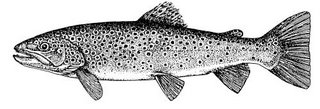
Before We Start ...
The Old Foodie has two announcements:
1. There was an extra posting on Saturday, as my belated contribution to October's Breast Cancer Awareness "Pink" theme. To find it, please scroll down to below today's story, which will first take you past ...
2. A competition announcement:
As a celebration of the one-year birthday of The Old Foodie on Tuesday, October 31st, there will be a quiz, with a prize. The questions will be posted on Tuesday. If you have been paying attention the answers will be easy. For more details as to the prize and the entry conditions, please scroll down below today's story, which starts now ...
Today, October 30th …
John Oxley and his men explored the course of the Macquarie River (in New South Wales) in 1818 - at one point believing that it led to a vast inland sea, thus creating a persisting, and sadly untrue myth to intrigue a later series of explorers. On this day they finally reached the continental coastline.
“ … We passed for five miles and a half through the country described yesterday, when we arrived on the beach south-west of the Sugarloaf Point. … we went nearly six miles farther on the beach, and halted near a rocky point for the evening. This beach was a peculiarly productive one to us; a great number of fine fish resembling salmon, had been pursued through the surf by larger fish, and were left dry by the retiring tide: we picked up thirty-six, and a welcome prize they proved to us.”
Hunger has been an occupational hazard of explorers throughout history, and sufficient hunger will make almost anything palatable, so it is no wonder Oxley’s men were delighted with their serendipitous dinner. We don’t know exactly what they ate, but the coastal waters of eastern Australia provide a magnificent variety of fish, so it is reasonable to assume it would have been not just dinner, but delicious dinner - which makes the attitude of early settlers quite strange. For those who chose to settle in Australia in the early days, everything at “Home” (i.e England) was the Gold Standard, and that included the fish. An awful lot of “English” salmon found its way to the country (preserved of course) as the fish course for elegant dinners, and there were serious and prolonged attempts to establish an English salmon industry in Tasmania.
Ironically, now that we truly appreciate our fish, such largesse would be an unlikely find on a beach walk on the beautiful northern New South Wales coastline. Such appreciation took some time to develop. Even by 1893, when Philip Muskett published his “Art of Living in Australia”, he felt moved to say:
“ Along with its great ally, the oyster, fish undoubtedly occupies one of the highest places on the food list. Unfortunately, it is not met with in every home as it should be, its high price and scarcity combining to make it conspicuous by its absence. That such a state of things is actually the case in Australia can only be deeply deplored. Let us suppose, for instance, that we were as well supplied with fish as we are entitled to be, considering that we are of a maritime race and that we live near the sea. If such were the case—and I would it were so— how would a sudden reversal to the present state of our fish supply be received? Would it not give rise to protestations, to indignation meetings, to questionings in the House, and to the papers being filled with complaints, till matters were put right again? Yes, indeed, all these things would happen! meanwhile, however, we continue placidly in our fishless state of existence, and the finny tribe, outside in the deep sea, have a good time in consequence.”
The book did include some recipes “created by Mrs H. Wicken, Lecturer on Cookery to the Technical College, Sydney”. Here is one of them, chosen for no better reason than its “S” shape, proving that one can make something interesting and elegant with mere local fish.
FISH PUDDING
1/2 lb. Blue Cod*—5d.
1 lb. Potatoes—1d.
1 oz. Butter—1d.
1 Egg
Pepper and Salt—1d.
Total Cost—8d.
Time—Half an Hour
Use cold fish and potatoes, if there are any in the larder; if not, boil a piece of blue smoked cod in some water for five minutes. Flake it up free from skin and bone and put it into a basin; mash up the potatoes and mix them in with the pepper and salt. Bind into a paste with an egg; rub some dripping on a baking sheet, turn the mixture on to it and shape into the letter S, brush over with egg or milk, and bake till brown. Slip it off on to a hot dish, and garnish with parsley.
*Common fish names are always problematic, and it is not possible to be certain that the cook was referring to what we now call Blue Cod or Trout Cod, and which was officially named Maccullochella macquariensis a century after Oxley’s journey. It would not have been Oxley’s fish, in spite of the fact that it was named after the river he explored (which was named for Lachlan Macquarie, Governor of NSW from 1810-1821), as it is a fresh-water fish. In another irony, it is one of the species that is now sufficiently rare that it is fully protected.
Tomorrow’s Story …
Dinner for the Workers.
Quotation for the Day …
A correspondent in the “Magazine of Domestic Economy” asserts that it is a well-known fact, not only in our own country, but in every part of the world, especially on the North American continent, that icthyophagists, or feeders on fish, who dwell on the sea-coast, are a hardy, well-conditioned, and healthy race of men. Edward Abbott, “The Australian Aristologist” (1864).
No comments:
Post a Comment